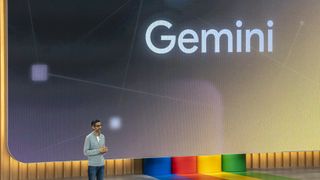Gemini Live may soon compete for space with Copilot on the Windows taskbar
With Chrome as the Trojan Horse

Google's Gemini Live AI assistant may soon make a big leap to Windows taskbars, according to a Chromium patch spotted by Windows Latest.
Though Gemini access is already available through Chrome's address bar, the Chromium patch hints at plans to integrate this AI feature into Chrome for Windows 11, Windows 10, and potentially other platforms. If this happens, it could make Gemini Live a key part of your browsing experience.
Gemini Live is designed for natural, human-like conversations while helping users a la ChatGPT. You can converse in real-time with the AI and get answers that consider context and tone of voice. It's a feature limited to the Gemini app for Android and iOS devices for now, but Google’s plans clearly involve making it much more widely available.
The patch to Chromium’s codebase that raises the possibility is labeled as addressing “floaty detach on Windows.” It’s connected to what Google calls GLIC, which appears to be shorthand for Gemini Live in Chrome. Essentially, Google is developing a floating panel to host Gemini Live in its browser. Chrome could be used for Gemini Live, which is what Microsoft Edge was used for Copilot. Microsoft’s Copilot started as a sidebar feature in Edge before transitioning into a standalone app.
The references to a floating panel suggest Gemini Live might not be tied to the browser window. Instead, it could be a standalone assistant, accessible from the taskbar, always ready to help. The Chromium patch hints that Google has solved some of the technical issues around the floating window, allowing Gemini Live to pop out as its own interface, separate from Chrome itself.
Floating Gemini
When the feature is released, you might simply click on a taskbar icon to summon Gemini Live, which could hover unobtrusively while you’re drafting an email or researching online. Unlike Copilot, which sometimes felt clunky, Gemini Live could offer a smoother and more conversational experience. And because it’s Google, you can expect tight integration with its ecosystem, from Gmail to Android devices.
Gemini Live would be ever-present, a permanent element of both online browsing and the desktop experience. Of course, that presumes any of the issues around the feature are dealt with beforehand. Chrome is already a resource-heavy browser, and adding AI features might raise concerns about performance, not to mention any expanded privacy concerns. Still, as Google tries to make Gemini usage universal, this will be a key step to beating Microsoft and other AI rivals.
Get daily insight, inspiration and deals in your inbox
Sign up for breaking news, reviews, opinion, top tech deals, and more.
You might also like

Eric Hal Schwartz is a freelance writer for TechRadar with more than 15 years of experience covering the intersection of the world and technology. For the last five years, he served as head writer for Voicebot.ai and was on the leading edge of reporting on generative AI and large language models. He's since become an expert on the products of generative AI models, such as OpenAI’s ChatGPT, Anthropic’s Claude, Google Gemini, and every other synthetic media tool. His experience runs the gamut of media, including print, digital, broadcast, and live events. Now, he's continuing to tell the stories people want and need to hear about the rapidly evolving AI space and its impact on their lives. Eric is based in New York City.